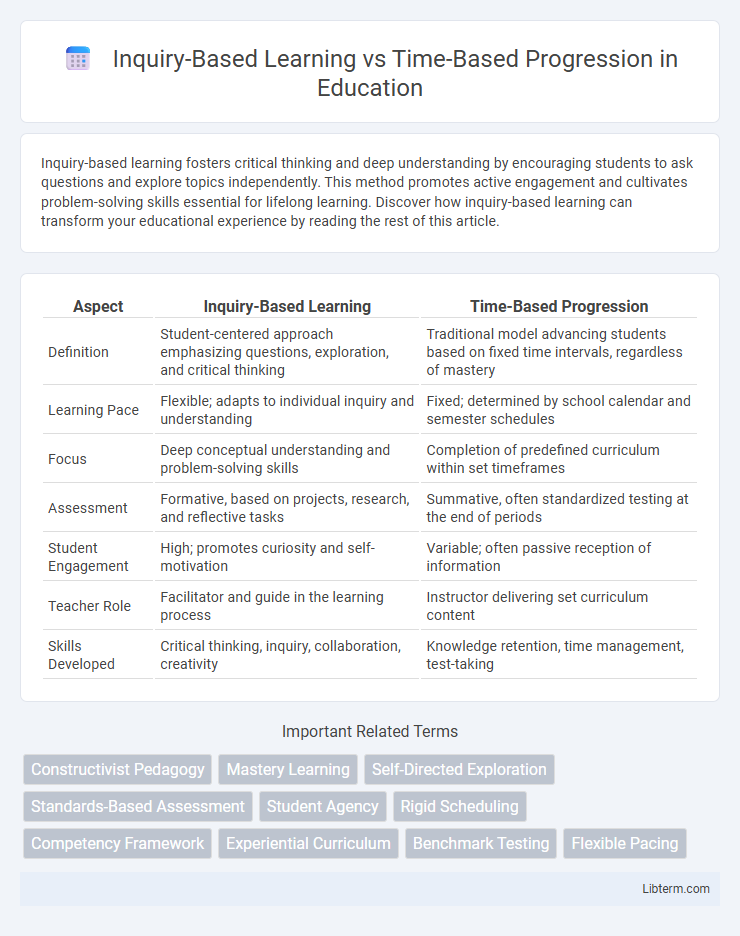Inquiry-based learning fosters critical thinking and deep understanding by encouraging students to ask questions and explore topics independently. This method promotes active engagement and cultivates problem-solving skills essential for lifelong learning. Discover how inquiry-based learning can transform your educational experience by reading the rest of this article.
Table of Comparison
| Aspect | Inquiry-Based Learning | Time-Based Progression |
|---|---|---|
| Definition | Student-centered approach emphasizing questions, exploration, and critical thinking | Traditional model advancing students based on fixed time intervals, regardless of mastery |
| Learning Pace | Flexible; adapts to individual inquiry and understanding | Fixed; determined by school calendar and semester schedules |
| Focus | Deep conceptual understanding and problem-solving skills | Completion of predefined curriculum within set timeframes |
| Assessment | Formative, based on projects, research, and reflective tasks | Summative, often standardized testing at the end of periods |
| Student Engagement | High; promotes curiosity and self-motivation | Variable; often passive reception of information |
| Teacher Role | Facilitator and guide in the learning process | Instructor delivering set curriculum content |
| Skills Developed | Critical thinking, inquiry, collaboration, creativity | Knowledge retention, time management, test-taking |
Introduction to Inquiry-Based Learning and Time-Based Progression
Inquiry-Based Learning emphasizes student-driven exploration and critical thinking, allowing learners to progress by mastering concepts through active questioning and investigation. Time-Based Progression relies on fixed schedules and predetermined timeframes, advancing students regardless of individual understanding or skill acquisition. This contrast highlights the flexibility of Inquiry-Based Learning compared to the rigidity of traditional time-bound educational models.
Defining Inquiry-Based Learning
Inquiry-Based Learning centers on students actively exploring questions, problems, or scenarios, fostering critical thinking and deep understanding through investigation rather than passive absorption. This learner-driven approach emphasizes curiosity, hands-on experiences, and reflective thinking, allowing knowledge to emerge naturally from the inquiry process. Unlike Time-Based Progression, which advances students based on fixed schedules, Inquiry-Based Learning adapts pacing to individual discovery and mastery.
Understanding Time-Based Progression
Time-Based Progression in education structures learning around fixed time intervals, such as semesters or instructional hours, regardless of individual student mastery. This model emphasizes uniform pacing and standardized assessment schedules, often leading to varied levels of understanding among students at the end of each time period. Understanding Time-Based Progression highlights the potential for gaps in knowledge retention and the challenge of accommodating diverse learning speeds within a one-size-fits-all timeline.
Core Philosophies Compared
Inquiry-Based Learning centers on fostering critical thinking and student-driven exploration, emphasizing mastery through understanding concepts deeply rather than adhering to fixed schedules. Time-Based Progression relies on predetermined timelines and curriculum pacing, prioritizing coverage over individual comprehension levels. The core philosophy of Inquiry-Based Learning promotes adaptive, personalized education, contrasting with the standardized, time-bound structure of Time-Based Progression.
Student Engagement and Motivation
Inquiry-Based Learning enhances student engagement by encouraging curiosity and active problem-solving, fostering intrinsic motivation through meaningful exploration. Time-Based Progression often leads to passive learning since students move at a fixed pace regardless of individual interest or comprehension levels. Empirical studies reveal that inquiry-driven methods significantly boost long-term motivation and deepen content retention compared to traditional time-constrained approaches.
Impact on Knowledge Retention
Inquiry-Based Learning enhances knowledge retention by actively engaging students in exploration and critical thinking, fostering deeper understanding and long-term memory consolidation. Time-Based Progression often leads to superficial learning, as students move forward regardless of mastery, which can result in fragmented knowledge retention. Studies show that students in inquiry-based environments retain information more effectively due to personalized pacing and meaningful context integration.
Assessment Strategies in Both Approaches
Inquiry-Based Learning employs formative assessments such as project presentations, peer reviews, and reflective journals to gauge student understanding and encourage deeper cognitive engagement. Time-Based Progression relies on summative assessments including standardized tests and end-of-term exams to measure knowledge acquisition within fixed timeframes. Combining continuous feedback mechanisms in Inquiry-Based Learning with time-bound evaluative criteria from Time-Based Progression can create a balanced and adaptive assessment framework.
Adapting to Diverse Learner Needs
Inquiry-Based Learning tailors education by encouraging students to explore topics at their own pace, fostering deeper understanding through curiosity-driven investigation. Time-Based Progression follows a fixed schedule, which may not accommodate varying learner speeds or individual comprehension levels. Adapting to diverse learner needs is more effectively achieved with Inquiry-Based Learning, as it allows personalized exploration and flexible mastering of concepts.
Challenges and Limitations
Inquiry-Based Learning faces challenges including uneven student readiness, which can lead to gaps in foundational knowledge and difficulty maintaining curriculum pacing. Time-Based Progression limits personalized learning by advancing students based on fixed schedules rather than mastery, potentially causing disengagement and shallow understanding. Both approaches struggle with balancing individualized learning needs against standardized assessment requirements and resource constraints within educational institutions.
Choosing the Right Approach for Your Classroom
Inquiry-based learning fosters critical thinking and student engagement by encouraging exploration and problem-solving, promoting deeper understanding through active participation. Time-based progression follows a fixed schedule, ensuring coverage of curriculum but often limiting flexibility for individual learning paces. Selecting the right approach depends on classroom goals, student needs, and subject matter, balancing structure with personalized, inquiry-driven experiences to maximize educational outcomes.
Inquiry-Based Learning Infographic

 libterm.com
libterm.com